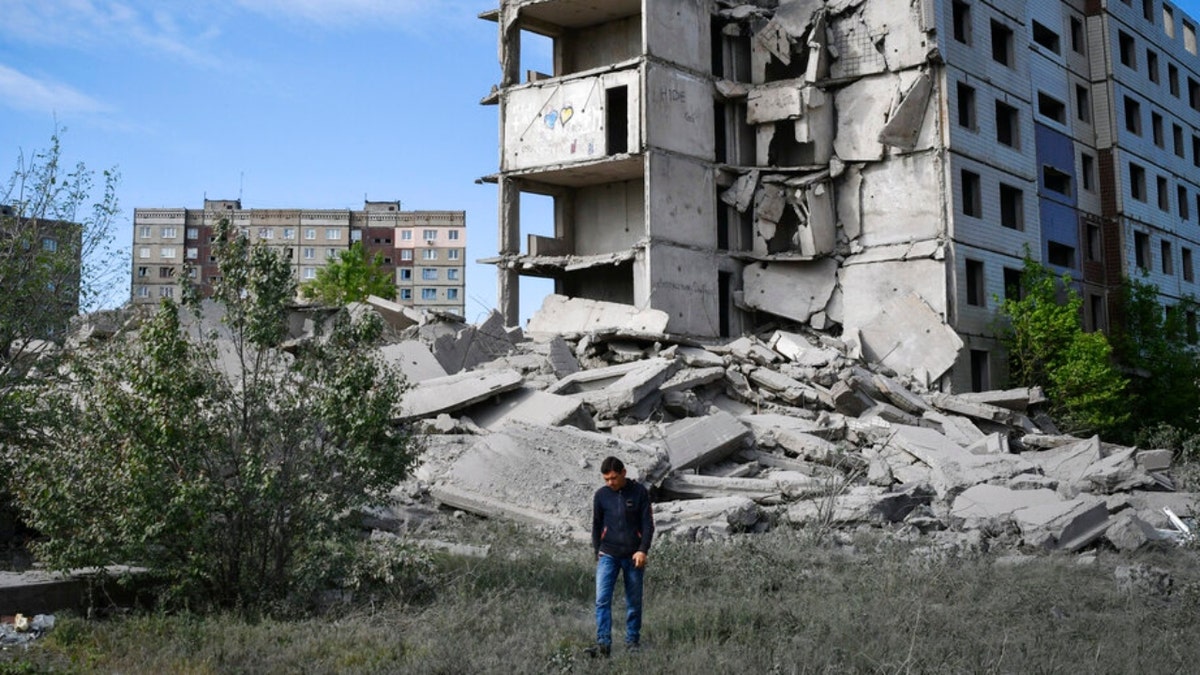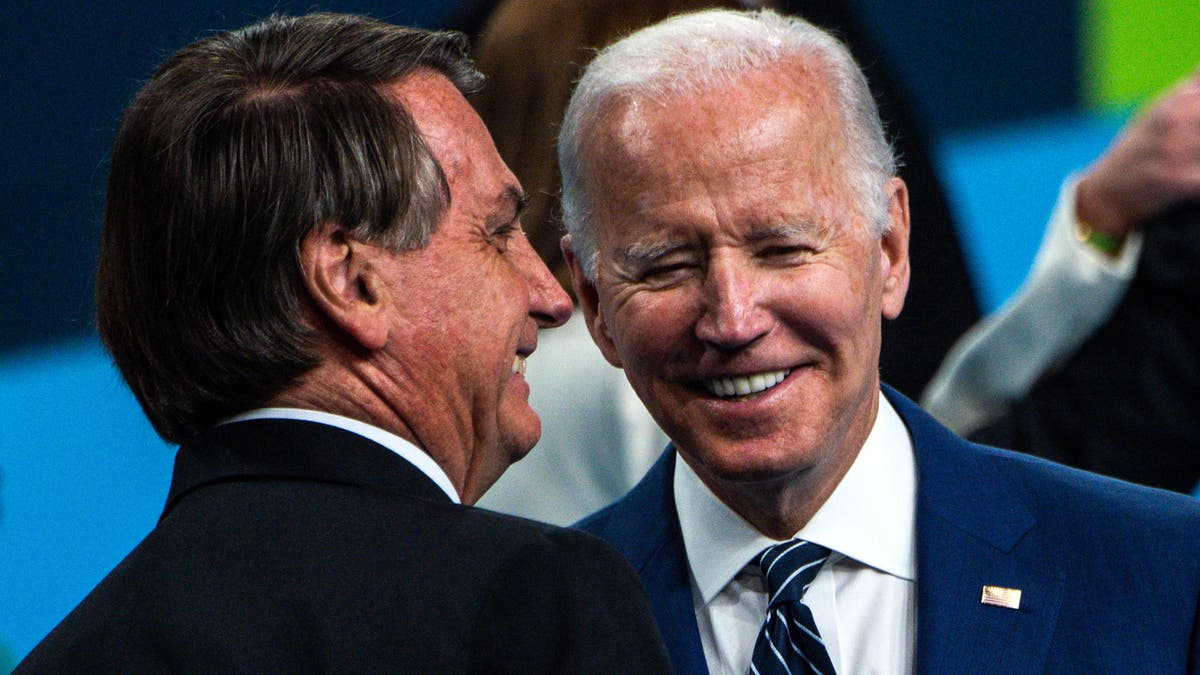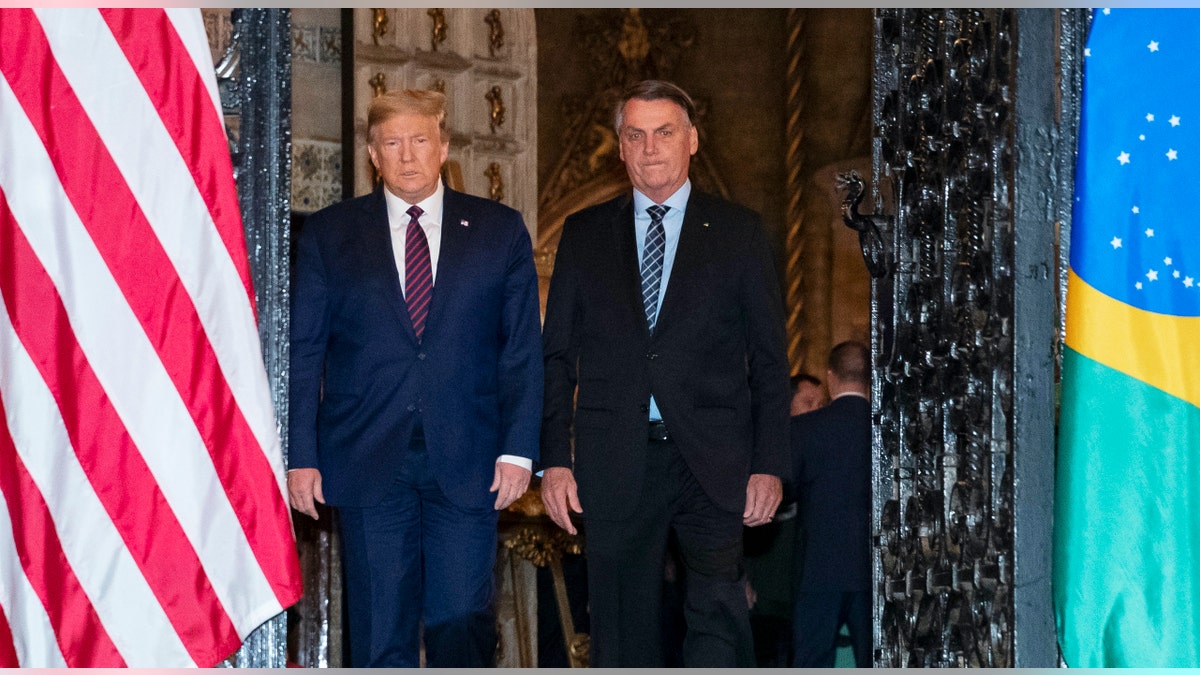Brazil's Foreign Minister speaks with Fox News Digital
Brazil has close relations with the U.S., Russia, and China who is its largest trading partner.
Brazilian Foreign Minister Carlos Franca described his country’s pragmatic policies with the rest of the world noting that Brazil does what is best for its own national interests, and that means having a close relationship with the U.S., Russia and China.
Franca sat down with Fox News Digital in an exclusive and wide-ranging interview during a visit to New York last week. Brazil is this month’s rotating president of the United Nations Security Council. He noted that the focus of the presidency was on the consequences of the war in Ukraine, and that would likely include a closed meeting on the consequences of food insecurity caused by the war.
Franca said he understood the criticism of the U.N. Security Council, and its lack of progress in halting the war, and added the best bet for peace was to increase dialogue and enforce diplomacy on the situation.
In regards to his country’s position on the Russian invasion of Ukraine, Franca called for an immediate ceasefire and said that "We stand on the side of Brazil…Brazil is a global player, so we don't have to side with one side, Ukraine, or Russia…We have the right to have our own foreign policy, the one who suites best what we consider to be our national interests."

From left to right, U.S. State Secretary Antony Blinken, Brazilian Foreign Minister Carlos Franca, attend the opening session of the G-20 Foreign Ministers' Meeting in Nusa Dua, Bali, Indonesia, Friday, July 8, 2022. (AP Photo/Dita Alangkara, Pool)
He said his country has a "very balanced position," in regard to Russia’s invasion of Ukraine. He said Brazil had criticized the Russians in the U.N. Security Council, which he said was the right and specific forum to discuss the war and the question of security and issues of peace, and questioned the need for other U.N. bodies to take up the issue.
He said President Jair Bolsonaro has a good relationship with Russia President Putin and could help if asked to mediate peace, but he said Turkey is the main player right now in trying to achieve a ceasefire, but Brazil stands ready to help if asked.
Franca recently met with both Secretary of State Antony Blinken and his Russian counterpart Sergei Lavrov at the G-20 ministers meeting in Bali, Indonesia. When asked whether he thought Lavrov was ready to end Russia’s war against Ukraine, Franca said, "I think that our conversation was not so candid…but of course I asked him about the opportunity of peace." Franca explained Brazil defends the sovereignty of countries and that was why there needed to be an immediate ceasefire and would be first and important step for now.
Brazil is the largest country in South America and has always enjoyed close ties with the U.S., but in recent years, it has developed a very close relationship with Beijing.
Franca noted that China was his country’s largest trading partner by far, and Brazilian exports to China are bigger than the trade with the U.S. As a member of the BRICS group of countries, which includes China and Russia, Franca spoke of his country's close relationship with Beijing.
He praised Beijing’s help during the pandemic "we kept the value chains open; we keep our ports open; we keep our shipments flowing. We are reliable. That is the message, you know, the Chinese understand. So they are our good partners."

A local resident walks next to a house destroyed in a Russian shelling in Kramatorsk, Ukraine, Wednesday, May 25, 2022. ((AP Photo/Andriy Andriyenko))
The foreign minister noted that last year Brazil exported more to Asia, not including China and Japan, than to the European Union. He said this could be a trend that is focused more on Asia including the ASEAN countries and China. He suggested "that if you are in the Western Hemisphere maybe, just maybe Brazil should be the focus of more American investments."
Franca also said it was important for more U.S. companies to come and invest in Brazil. He pointed to President Bolsonaro’s interview with Tucker Carlson earlier this month when Bolsonaro called for more investments from American companies and noted that would be a good counterbalance since, "Brazil sees itself as a global player even in terms of global trade."
MCCAUL: US MUST ‘WAKE UP’ AND INVEST IN LATIN AMERICA TO GAIN COMPETITIVE EDGE ON CHINA
Franca said Brazil did not view China as a threat: "We don't see China as a threat. I see China that it's a superpower that we can deal with if we were dealing with and if we have a very mutually beneficial relationship. I must tell you that who first helped Brazil with vaccines? It was China in the darkest hour of the pandemic. The first vaccines arrived were from China," he said.
When asked about the security threat regarding China, Franca said that debate was more "active" in the U.S., the U.K., and Canada. "You have Chinese companies, you have American companies, you have European companies, you know, competing side by side. I think that it's certainly a debate that its much more common than they think in those countries than (in) countries like Brazil."
While speaking on the risks and the fallout of over-dependency on China with Sri Lanka being a prime example, Fox News Digital asked Franca how Brazil deals with China and the advice, he had to offer to U.S. policymakers in regard to the stealing of intellectual property, spying and security. Franca said it was difficult to give advice to other countries on what he said was to do in dealing with a "superpower," like China.
Franca said that only 20 years ago China was a developing country "But today it's a superpower in terms of science and technology. In terms of defense, of course in terms of economy we have very good relations with China, of course, with the rate increasingly rapidly, in a very fast way, we don’t have no problems in dealing with China."
He continued "As I told you, we see Brazil as a global player, you know, so we can have relations with the United States with China."
While President Trump and his Brazilian counterpart Bolsonaro shared a close bond, reports have suggested there have been some differences of opinion with the Biden administration. On the importance of the institutional relationship between the U.S. and Brazil, Franca highlighted the importance of the historic relationship.
"The most important thing is, it's the historical roots that links Brazil and the United States. We share the same common values. If you think the constitution, you know the basis and the foundation of the Brazilian constitution, you see that we have the same values that they have from the Independence of the United States." He said that meant an independent judiciary, respect for civil rights, strong democratic institutions with a strong parliament, noting the two countries had the same foundations.

TOPSHOT - Brazil's President Jair Bolsonaro (L) and U.S. President Joe Biden chat after posing for a family photo during the 9th Summit of the Americas in Los Angeles, California, June 10, 2022. (Photo by Chandan KHANNA / AFP) (Photo by CHANDAN KHANNA/AFP via Getty Images) (Photo by Chandan KHANNA / AFP) (Photo by CHANDAN KHANNA/AFP via Getty Images))
Franca said at last month’s Summit of the Americas in Los Angeles the high-level meeting between President Biden and President Bolsonaro had some good results.
"I think that the prospects are so good. Recently, you know, the day President Bolsonaro arrived in L.A. for his meeting with President Biden and to attend, of course, the Summit of the Americas. President Bolsonaro signed a decree that was the implementation of an agreement that was signed in 2020 between the two governments." He said the agreement will make foreign trade between the two countries easier and make things hassle-free for both importers and exporters by decreasing the bureaucracy.
Speaking on trade, Franca made clear relations with the U.S. continue to be strong. He said he enjoyed a very good dialogue with Blinken. He said they recently met on the sidelines of the G-20 meeting in Bali where he said Brazil was invited to attend a conference next week on the global supply chain hosted by Blinken.

President Donald Trump arrive before a dinner with Brazilian President Jair Bolsonaro at Mar-a-Lago, Saturday, March 7, 2020, in Palm Beach, Fla. (AP Photo/Alex Brandon) ((AP Photo/Alex Brandon))
He was bullish on U.S.-Brazil cooperation in the space industry. In 2019 Presidents' Trump and Bolsonaro signed the Technological Safeguards Agreement, which lets the U.S. use Brazil’s Alcantara Aerospace Launch Base for satellites. Franca said he was hopeful about the future of the Alcantara launch site.
"Look, Alcantara launching site is a real wonder if you need to send a spacecraft to outer space because it's a very efficient location. I mean, you use…less fuel compared to other launching sites, and it's so close to the United States because we are in the same Western Hemisphere that it makes perfect sense if you can join efforts to make it possible." He said was sure that in the near future it "will be a reality."
When asked why he thought the continent had recently shifted leftwards, Franca said it could be due to the economic consequences of the pandemic, but noted that was more "a sociological guess," but he did not believe ideology "could hinder international relations," and noted his country’s relationship with Peru. Peru elected a leftist President Pedro Castillo, but he and the right-wing Bolsonaro have been able to work on shared interests.
He said both presidents met recently and have shared interests on tourism, border patrol, stopping drug traffickers and dealers and called Peru a good partner. He said even if there were ideological values they can still work together.
However, Franca drew the line with the likes of Venezuela and Cuba, who he said did not share the values of freedom of speech and democracy and that is what prevents such a relationship. "It would also be very difficult for us to deal with a country like Venezuela: they don't have free elections, you know, democracy, it’s a question mark, you have political prisoners…he said that makes an obstacle for a fluid relationship."
He also conceded that Iran and Venezuela had a good relationship noting it was a close one. He said Venezuela today was "not a good example…for the region in terms of respect for democracy, freedom of speech and these values that we share with the U.S. at the moment, and the western world in general," he concluded.
Fox News' Frank Miles contributed to this report.




















